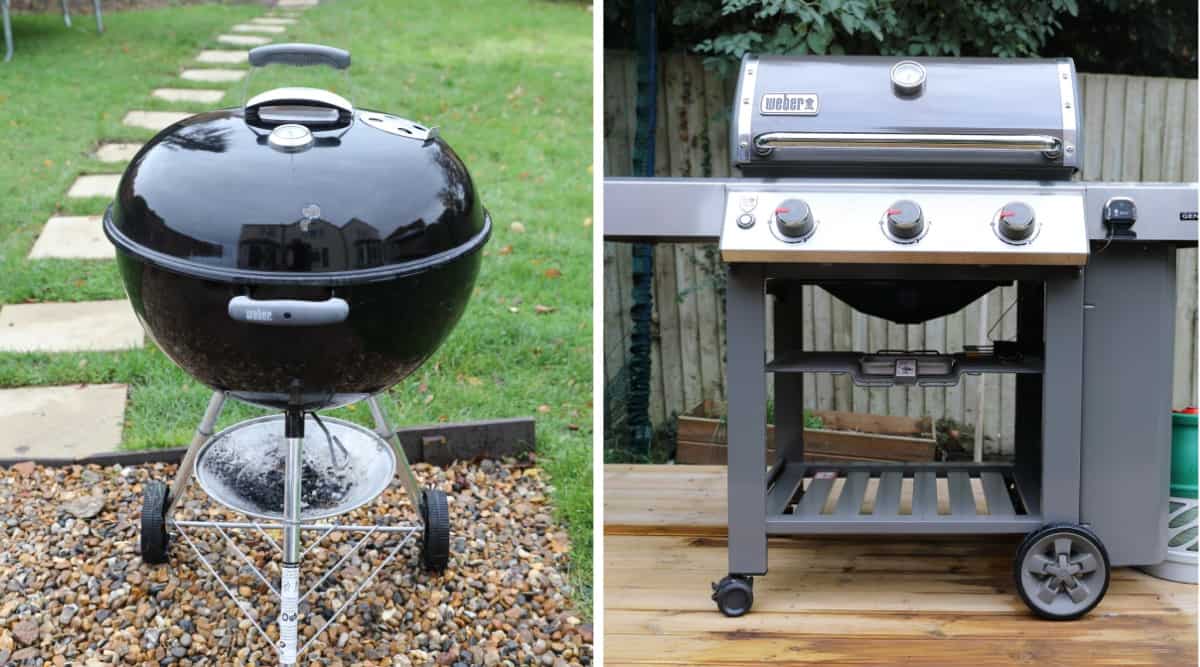
Choosing between charcoal and gas grills mostly boils down to flavor versus convenience.
Over my years of grilling, I’ve tested and used both types extensively. From my experience, both types have their merits because they serve different needs and preferences. And I still own and use both types regularly.
Charcoal grills rule supreme in most, if not all, grilling groups and forums. ‘Purists’ say you do not get a proper BBQ flavor on a gas grill, it’s cheating, you may as well use your kitchen oven, etc. I disagree.
So, in this article, we’d like to weigh in on the debate and discuss charcoal vs gas grills. We’ll compare them side by side, discuss their pros and cons, and explore detailed aspects like cost, maintenance, and versatility. I’ll share insights drawn from personal experience to ensure you have all the information necessary to select the grill that best suits your needs.
Note: This is one in a series of 4 grill comparison articles where we compare the different fuel types, so we also invite you to check out: Pellet Grill vs Charcoal Grill, Pellet Grill Vs Gas Grill, and Electric vs Gas Grill.
Jump to:
Charcoal Vs Gas Grills, At a Glance Comparison Table
Charcoal and gas grills each have unique strengths and weaknesses, summarized in the following table for a quick at-a-glance overview.
| Criteria | Charcoal Grills | Gas Grills |
|---|---|---|
| Flavor Profile | Strong, smoky flavor; more traditional BBQ taste | Milder flavor; less smoky, but can use wood chips |
| Initial Cost | Generally less expensive | More expensive due to complex build and fuel lines |
| Operating Costs | Cost of charcoal is higher than gas | Cost of propane or natural gas is lower |
| Average Capacity | Varies, but often smaller than gas grills | Typically larger, suitable for bigger gatherings |
| Ease of Use | Requires more skill for fire management and temperature control | Easier to use; quick start and temperature control |
| Versatility | Better for high-heat searing and slower cooking | More versatile; can include side burners, rotisserie |
| Temperature Range | Very low to very high temperatures, 100 °F to 1200 °F | 200 °F to 600 °F (higher with an infrared burner) |
| Temperature Control | More challenging; requires fire management and vent control | Easy control with knobs; more precise |
| Fire-Up and Cool-Down Time | Longer to ignite and cool down, 30 minutes+ | Quick to start and cool down in 3 to 10 minutes |
| Clean-Up | More time-consuming; ash cleanup | Easier cleanup; no ash, just grease management |
| Grill Lifespan | Can last long but may rust without proper care | Generally longer lifespan with proper maintenance |
Choosing the Right Grill Type for You
I’ve had the pleasure of extensively using both charcoal and gas grills for years, and I can tell you that the right grill choice boils down to personal preference and specific needs. Some people prefer the smoky flavor and hands-on experience of charcoal grilling. In contrast, others appreciate the convenience and control offered by gas grills.
The following sections will outline who each type of grill is best suited to and the pros and cons of each so you can decide which type of grill is best for you.
Who are Charcoal Grills Best Suited to?
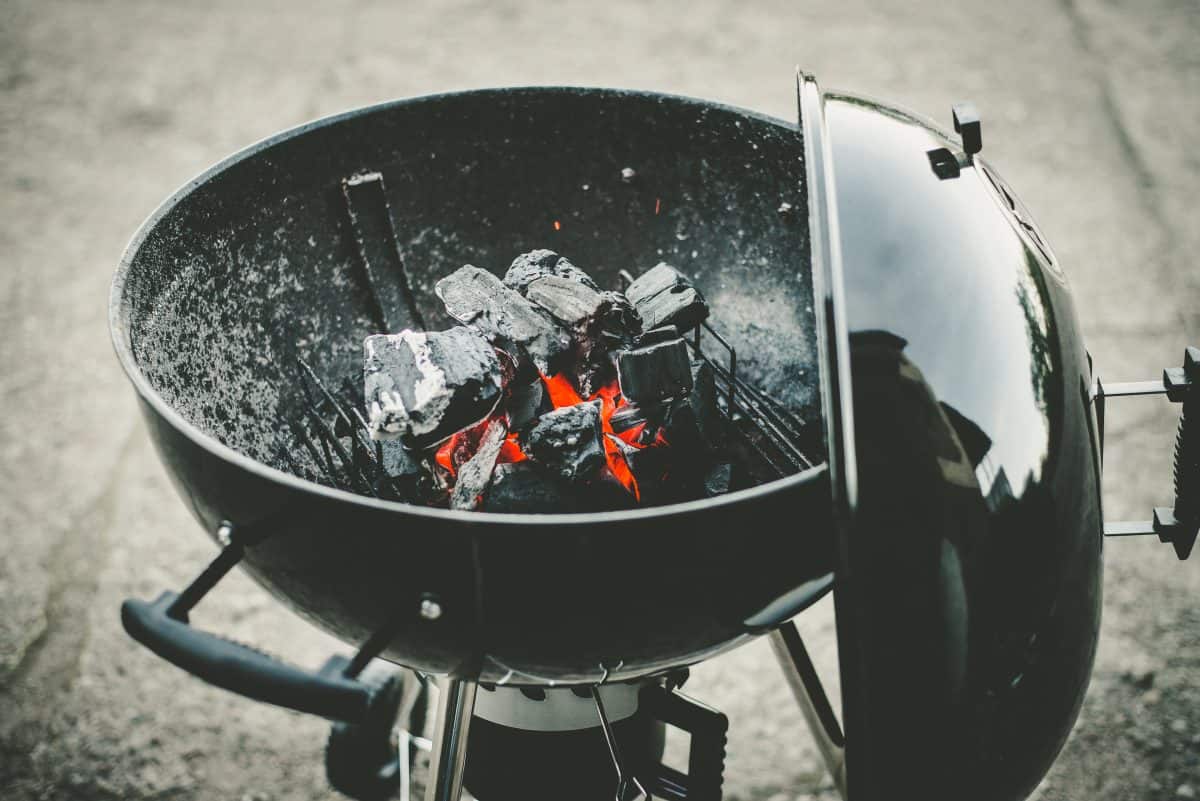
Charcoal grills are for those who value flavor over anything else, even if it comes at the cost of investing more time and energy into cooking and cleaning. You simply cannot get the same deep, smoky flavor from a gas grill that you can with charcoal.
Also, seasoned grillers favor charcoal grills because they enjoy the hands-on experience of lighting the charcoal and managing the heat.
Another reason charcoal grills are popular is their ability to reach super high temperatures – ideal for searing meat. Charcoal gets way hotter than gas, so searing is easier and more effective on charcoal grills.
Portability is another advantage of charcoal grills. Compared to gas grills that are bigger and harder to move about, you can pack them up and take them wherever you go.
From a financial perspective, charcoal grills tend to be less expensive initially than gas grills. This makes them appealing to those who are conscious about their budget but still want a quality grilling experience. But they cost more to run in the long run because whichever charcoal you choose, it costs more to run that gas.
It’s also worth noting that charcoal grilling requires more time investment. The process is a bit longer than on gas grills, from preheating to cooking. But for many, this only enhances the overall grilling experience, turning cooking into a fun, engaging activity rather than a chore.
What are the Pros and Cons of Charcoal Grills?
The pros and cons of charcoal grills are:
Pros
- Gives food a rich, smoky flavor.
- Allows more effective searing due to higher heat.
- More portable, perfect for picnics and camping.
- Offers a traditional grilling experience loved by enthusiasts.
- Fewer parts make them more durable and long-lasting.
Cons
- Charcoal grills take time to heat up, which could delay cooking.
- Cleaning charcoal grills can be messy due to ash and grease.
- Learning to control temperature on charcoal grills is difficult.
- Constantly buying charcoal adds extra cost
- Charcoal grills lack convenient features like push-button ignition and temperature dials
- Smoke emissions from charcoal grills may lead to restrictions in urban areas.
Who are Gas Grills Best Suited to?
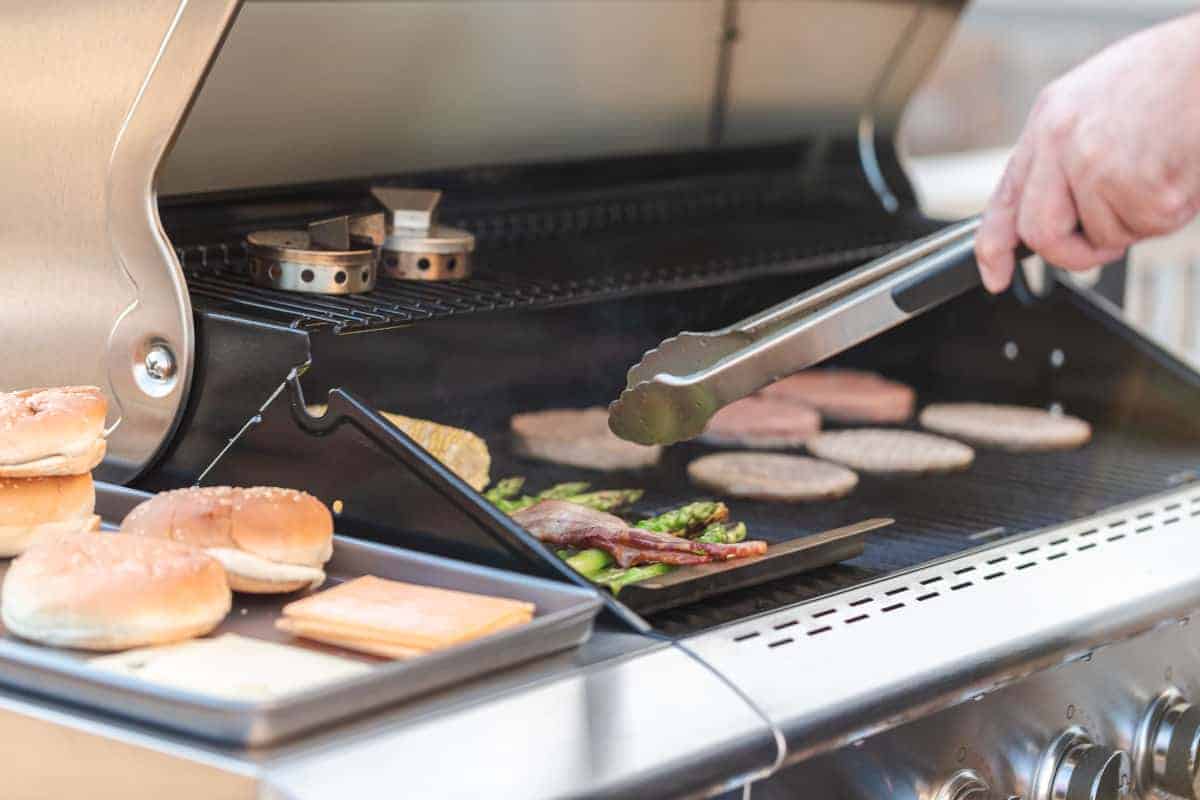
Gas grills are for those who value convenience, quick start-up, and easy maintenance over anything else.
These grills are ideal if you seek precise temperature control for consistent cooking results. They provide a quicker, more convenient grilling experience than charcoal grills, making them suitable for people who regularly entertain large groups and need an efficient cooking process.
For users living in areas with regulations or space limitations prohibiting the use of charcoal, gas grills become a perfect choice. They are cleaner, producing less ash and debris than charcoal grills. This eliminates the hassle of dealing with ash and embers, which appeals to those who prefer a cleaner cooking process.
The flavor profile is the most significant disadvantage of gas grills compared to charcoal. Cooking over charcoal adds a distinctive smoky flavor that is harder to achieve on gas grills. I have an article explaining how you can add smoke flavor with a wood chip box on a gas grill, but it’s still not quite the same.
So, if you’re less concerned about achieving a smoky flavor in your food, gas grills are the way to go. And because they are larger, they also cater to those who prefer multiple cooking zones for different types of food, providing flexibility in grilling various dishes simultaneously.
What are the Pros and Cons of Gas Grills?
The pros and cons of gas grills are:
Pros
- Quick start-up and no extensive preheating for convenience.
- Precise cooking due to easy temperature control.
- Cleaner operation with less ash and soot than charcoal grills.
- Suitable for beginners due to lower skill requirement.
- Often include extra features like side burners and rotisserie kits.
- Readily available and cheaper fuel.
Cons
- Lacks charcoal grill’s smoky flavor.
- Higher initial cost compared to charcoal grills.
- More components prone to breakage or need maintenance.
- Purists may not consider it ‘true grilling’ due to ease of use and no solid fuel.
- Limited temperature range can affect high heat searing.
- Non-renewable fuel usage is environmentally unfriendly.
Detailed Comparison of Charcoal Vs Gas Grills
Let’s discuss how charcoal and gas grills compare in various aspects. From the capacity and cooking area they offer, to the distinct flavor profiles they can help you achieve, each type of grill brings something unique to the table.
We will examine the initial cost and long-term expenses associated with each grill and their ease of use and versatility. Temperature is another crucial factor when grilling, so we’ll be comparing the temperature range these grills offer and how easy it is to control and manage that temperature.
Fire-up and cool-down times can affect your grilling experience, so we’ll look into that, too. Lastly, we’ll consider how clean-up processes differ between charcoal and gas grills and how weather conditions might affect your grilling experience.
By the end of this comparative analysis, you’ll understand what each type of grill has to offer.
Let’s move forward into our first topic: capacity and cooking area needs.
Capacity and Cooking Area Needs
Charcoal grills often offer a smaller cooking surface than gas grills, impacting the quantity of food you can grill at once. Considering the grill’s size before purchasing is advisable if you anticipate hosting large barbecues or cooking for a large family.
The cooking area affects not just the quantity of food but also how you utilize the grill. Both charcoal and gas grills require enough space for indirect grilling—a technique where food is cooked next to, not directly above, the heat source. This approach is crucial for cooking larger cuts of meat requiring slow, steady heat.
Finally, the grill’s size relative to your outdoor space is key. An overly large grill can be unwieldy, limiting movement around your patio or yard. However, a grill that is too small may not cater to your cooking requirements. Determining the right balance between the grill’s size and your outdoor space is crucial to ensure a convenient and efficient grilling experience.
Flavor Profile Differences
Words used to describe the flavor imparted by charcoal: “smoky,” “rich,” “earthy.” Words used to describe the flavor imparted by propane: There are none.
The distinct, smoky, rich, and earthy taste of a charcoal-grilled steak is no coincidence. It results from aromatics emitted by the wood-based charcoal during grilling. This taste is why many barbecue aficionados favor charcoal grilling over gas.
In contrast, gas grilling lacks this flavor-enhancing feature. As an odorless gas, propane grills meat without imparting any distinct taste. So, when using gas grills, you’ll have to depend on additional seasonings to achieve that desired smoky flavor.
So, if you want an authentic, smoky BBQ flavor, then charcoal is the way to go. Conversely, gas grills provide a cleaner flavor. So, if you desire food that lacks a smoky, charred taste, a gas grill might be the most suitable choice for you.
The grill design also plays a pivotal role in flavor differences. Gas grills, built without a tight seal, struggle to trap smoke and deliver the deep flavor infused by charcoal grills. Conversely, charcoal grills shine in this aspect due to their tight-fitting lid’s ability to contain smoke, which envelops and enriches the taste of grilled food.
I personally love the flavor you get from charcoal grilling, and it’s partially this that got me so obsessed with outdoor cooking in the first place. You just cannot recreate that immense charcoal grilled flavor in the kitchen, or on a gas grill.
Initial Cost
The basic cost of a charcoal grill ranges from dirt cheap to sticker-shock high. Gas grills start at pricey and go up to let’s-talk-financing pricing, with natural gas grills also typically a shade costlier than propane fueled.
If you opt to connect to your domicile’s gas line, depending on your setup, local codes, and the cost of materials and labor (unless you’re a DIYer), browsing estimates online suggests an average of $700.
So on average, charcoal grills are cheaper to buy than gas grills, typically a lot cheaper.
Ongoing Operating Costs
Overall, gas grills are cheaper to run than charcoal grills because the fuel is cheaper and last longer.
Charcoal grills require a very steady supply of renewable fuel. A 3-hour grilling session would need at least one refill. By contrast, if using gas, grilling could continue nonstop. Cost considerations would include the type of charcoal used, grill size, and frequency of grilling.
How much grilling can be had from a propane tank? There are several factors, but CWanamaker of Delishably provides a formula to help you figure it out.
In one example, it worked out to a month per tank. But, for a few hundred bucks, you can connect a grill to a domicile’s gas line, and you’re good to go as long as you pay the bill.
Ease of use
There’s no contest here: Gas grills are easier to use than charcoal grills.
A gas grill has a push-button ignition, and dials to accurately turn the temperature up or down. A charcoal grill requires fire building skills, and a steep learning curve to manage the temperature by the amount of fuel used and closing and opening bottom vents to control airflow to the fire.
Also, a gas grill is ready to cook within minutes of pushing the start button. By contrast, charcoal takes a good 15 to 45 minutes to get to cooking temperature, which is far longer to get going. So gas grills win on convenience.
Then with charcoal grills, there’s the extra stuff to haul out like a chimney starter, briquettes or lumpwood, and firelighters. And then the grill has to be brought up to the right temperature. Learning how to use a charcoal grill properly is not an exercise for the impatient cook.
Clean-up is the least favorite part of grilling. Both grill types require soap, water, and scrub brushes. Both should be thoroughly cleaned inside and out at least once a year.
A charcoal grill has ash to deal with. A gas grill has none. But a gas grill has more pieces (deflectors, burners) to be taken apart, individually scrubbed, rinsed, and dried before being put back together. The charcoal grill only has the grate and the pans. A gasser can be cleaned while it’s cooling down but for safety’s sake, the charcoal grill should be allowed to completely cool before dumping ashes. This may take a while.
There are products on the market for cleaning both types inside and out. For a charcoal grill, some consider a ball of foil the only equipment needed for cleaning.
Versatility
Gas grills win here. Typically being larger, it is easier to have different heat zones to cook foods at different temperatures. They also often come with side-burners and rotisserie kits as standard. However, gas grills need additional hardware for smoking — a wood chip smoker box — if you wish to add that extra layer of flavor.
The cost of an inbuilt or freestanding smoker can run from a few hundred to a few thousand dollars. Smoking requires adjusting gas flow and burner controls.
By contrast, a charcoal grill mostly only needs a lid, some wood, and a pan of water to make ridiculously good smoke-enhanced food. Both types can be used to roast foods and can be set-up for 2-zone grilling.
Temperature Range
A charcoal grill can operate from extremely low to searing temperatures of 1200 °F+. Gas grills struggle to get up past 550 °F+ most of the time. So charcoal grills win in this respect.
J. Kenji López-Alt of Serious Eats notes though that there’s rarely a need for such extreme temperatures; the 225 °F to 600 °F range of some gas grills neatly covers most grillers’ needs.
Temperature Control and Management
Gas grills win when it comes to ease of temperature control and management.
Learning to manage the temperature of charcoal grills takes time and involves arranging the pieces of fuel, tweaking vents to control airflow, and a few other variables.
By contrast, gas grills with their simple to operate gas burners are an excellent source of evenly controlled heat that you can instantly control with the simple turn of a knob.
But you’ll still need to learn the cool and hot zones on your model, the best configuration of temperature settings across all burners, and be comfortable adjusting the gas flow.
Fire-Up and Cool-Down Time
Gas grills heat up quickly, typically within less than 10 minutes, a significant advantage over charcoal grills, which take between 15 and 45 minutes to get to cooking temperatures.
The cool-down period before you can clean and pack the grill away is another factor where gas grills win. Charcoal grills have a lengthy cool-down period where you need to wait for all the coals to go out, whereas with gas you can instantly kill the flames with the turn of a dial.
Gas grills ability to be shut off instantly without waiting for coals to extinguish means you can clean and pack them away sooner.
Lastly, gas grills’ quick start-up and convenience make them more suitable for unplanned cooking or impromptu grilling sessions. If you appreciate the ability to grill spontaneously or value quick meal prep times, a gas grill might perfectly match your lifestyle.
Although I prefer the flavor afforded by using charcoal, it’s in times like these that I love my gas grills. My house is very social, and we sometimes get surprise guests. I love being able to fire up a gas grill for a super quick cook of some snacks to share, all without having to clean up ashes afterward.
Clean up and Maintenance
Gas grills are known for their convenient clean-up process. They have no ashes to dispose of and often come equipped with features like grease management systems and deflectors. These direct the grease into collection trays, making disposal hassle-free.
On the other hand, charcoal grills leave behind ash that requires removal, making the clean-up process a bit messier and more time-consuming.
However, irrespective of the type, every grill requires periodic scrubbing of its cooking surfaces and internal grates. Deep-cleaning frequency is higher for charcoal grills to prevent ash and grease buildup. But gas grills have an advantage here as they often feature removable parts that are dishwasher safe, simplifying the cleaning process even further.
Grill Lifespan
The average lifespan of charcoal grills tends to be shorter than that of gas grills, mainly due to the build quality and materials used.
Gas grills often feature more durable materials and construction, which can extend their lifespan. And this is typically reflected in the higher buying price. However, they aren’t without their complications. The complexity of parts in gas grills could potentially decrease their lifespan, as it increases the likelihood of needing repairs or replacement parts.
Manufacturers typically offer different warranty periods for charcoal and gas grills. Gas grills often come with more extended warranties, reflecting their higher price point and manufacturers’ confidence in their longevity. However, warranties vary by brand and model, so checking this before purchasing is essential.
I must say that of all the grills I own, a standard Weber charcoal kettle grill is my longest surviving. It is enameled iron and hence impervious to rust and corrosion. I have had one for nearly 20 years, and it’s still going strong. I have never owned a gas grill this long that didn’t need replacing!
Charcoal Vs Gas Grill: A Great Video Comparison
The most significant comparisons between gas and charcoal grills are neatly summarized in the following video from Reviewed.com which is worth a look.
Summing It All Up
To summarize what we’ve discussed so far, and what was shown in the video:
Charcoal Grills

What We Like About them
- The lovely blue smoke that means enhanced flavor to whatever cooks
- A better range of prices than gas, making a better fit for different budgets
- The ability to produce higher temperatures when charcoal grilling, needed for a good sear
What We Don’t Like About Them
- They can be messy
- Having to come back hours later to clean it
- Smoke getting in our eyes, lungs, hair
- Cost of the fuel
- Having to replenish fuel multiple times during a long cooking session
They are Best Suited to Those Who
- Are fans of the whole primal thing
- Like to travel and grill (gas grills can travel too, they’re just not as pack-and-go friendly)
- Think it’s not ‘cue if there’s no real charcoal
You May Prefer Gas if…
- You like quick meals on the grill
- Your domicile runs on gas
- You don’t feel the need for super hot temperatures
Gas Grills
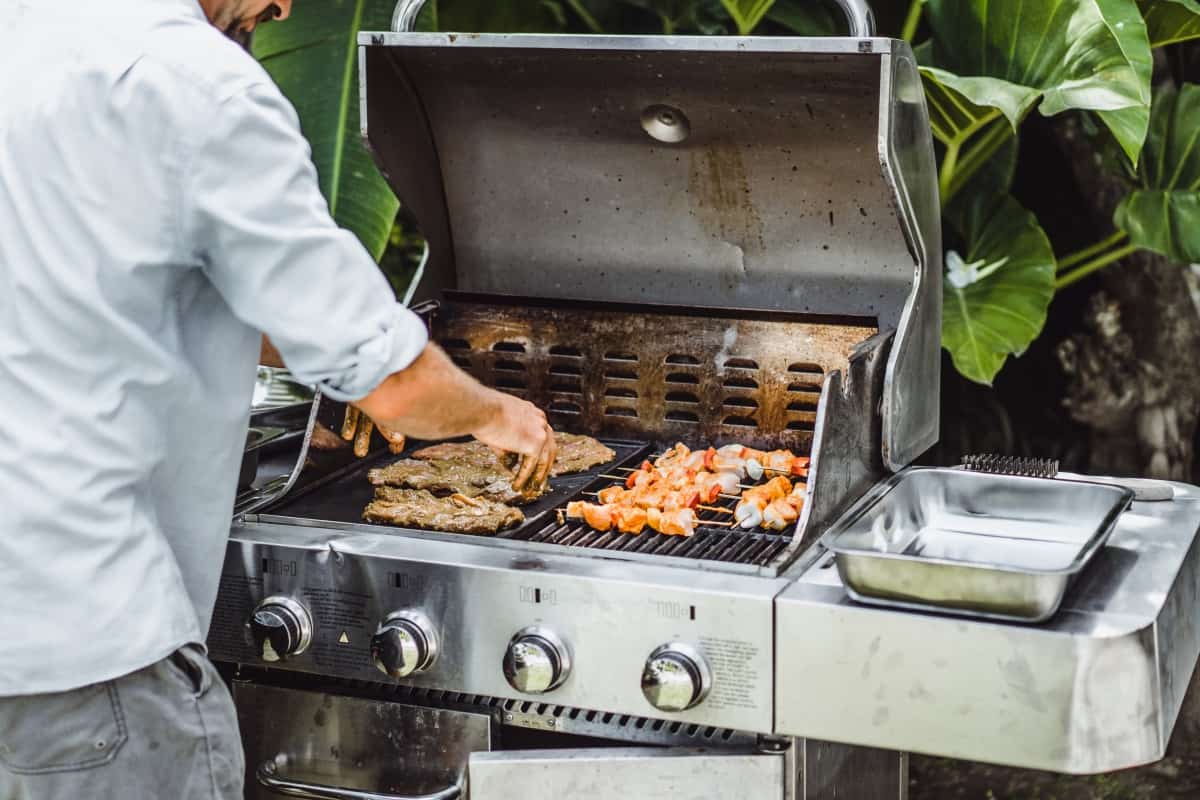
What We Like About Them
- Short start-to-serve time
- Fast clean-up
- Unrestricted grilling (see note below)
What We Don’t Like About Them
- Working harder to get a smoky flavor
- Low upper temp (<550) makes searing more difficult
- The potential risk of leakage which can create serious health issues. According to MedlinePlus of the U.S. National Library of Medicine, these include nausea, dizziness, nervousness, vomiting, increased heart rate, weakness, and fever.
- They’re fueled by a highly flammable substance
They are Best Suited to Those Who
- Can take or leave smoke flavor
- Like quick meals from the grill
- Hate waiting hours to clean up a grill
You May Prefer Charcoal if…
- You’re leery of handling a volatile substance (gas)
- Smoke flavor is non-negotiable
- You want to try (cold) smoking nuts, fish, or cheeses
Conclusion
Like beans in chili and sauce on brisket, charcoal vs gas will continue to be a topic over which good friends can come to blows. Staunch supporters from both camps will be happy to tell their view.
The open flame, smoked flavor, and fast cooking (super hot temps) make charcoal grilling and charcoal grills my favorite kind of barbecue. But I’m happy with either and here at FoodFireFriends I own both charcoal and propane grills. As long as you’re grilling, you’re winning 😉
What about you? Have you firmly taken your stand on one side or is there room for consideration of a broader view?


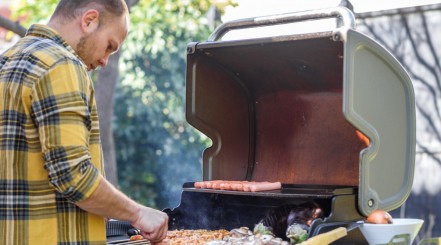

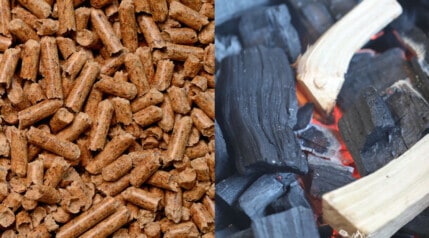
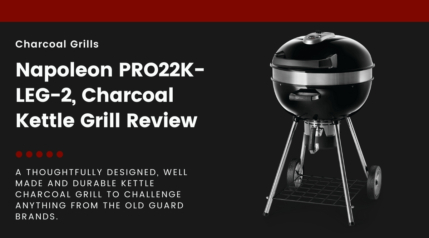
I am definitely a charcoal man myself. I have tried a gas grill and just didn’t rub me the same way. I do enjoy firing up charcoal in my trusty chimney and the temperature it can reach is very nice. Good post!
Same here, Jeff. I don’t even own a gas grill anymore. I sold the one I had a few years ago because I simply never used it. Sort of regret it, as it would be good to have one for content for this site, but other than that yes, I would never use it, I just feel cooking over charcoal adds a depth of flavor gas grills cannot match. (I would never knock someone else for cooking on gas, though. I totally understand the convenience of it, and good food is good food, however it’s cooked :-))